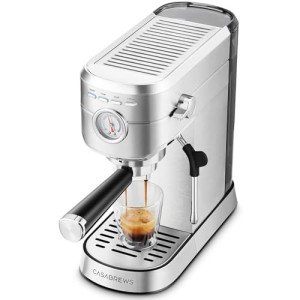Could Energy-Efficient Espresso Machines Be The Answer To Achieving 2024?
Energy-Efficient Espresso Machines: A Comprehensive Guide
In the world of coffee lovers, espresso machines are frequently concerned as vital appliances for developing rich, fragrant coffee. Nevertheless, the energy consumption associated with these machines can cause increased energy bills and ecological issues. As consumers end up being more eco-conscious, energy-efficient espresso machines have emerged as a popular choice. This post intends to explore the features, benefits, and options available in energy-efficient espresso machines, helping coffee enthusiasts make informed choices.
What Makes an Espresso Machine Energy-Efficient?
Energy-efficient espresso machines are designed to minimize energy consumption while preserving ideal performance. Several features add to the energy performance of these machines:
Insulation: High-quality insulation helps keep heat, minimizing the energy required to preserve ideal developing temperature levels.
Smart Technology: Many modern machines are equipped with programmable settings that permit users to schedule brewing times and change to standby mode when not in use.
Quick Heat-up Time: Energy-efficient espresso machines often use innovative heating innovations, such as thermoblocks or PID controllers, to heat water rapidly.
Low Wattage: Machines that operate at lower wattages take in less energy overall, making them more efficient.
Car Shut-off: Automatic shut-off features guarantee that the machine turns off after a particular period of lack of exercise, more decreasing energy waste.
Benefits of Energy-Efficient Espresso Machines
Buying an energy-efficient espresso machine can use numerous advantages:
Cost Savings: Over time, lower energy consumption can cause lowered electricity expenses.
Environmental Impact: Using less energy reduces carbon footprints, making these machines a more sustainable option for ecologically mindful consumers.
Improved Performance: Many energy-efficient designs also offer exceptional brewing innovations, resulting in better-tasting espresso.
Toughness: Typically, energy-efficient machines are developed with high-quality components, causing greater durability.
Functions to Consider
When selecting an energy-efficient espresso machine, a number of features ought to be taken into account:
- Type of Machine: Options consist of manual, semi-automatic, and completely automatic models, each with differing degrees of user control and automation.
- Brew Quality: Look for machines that make use of high-quality developing systems to make sure ideal taste extraction.
- Maintenance: Some machines have self-cleaning features that can conserve energy and effort in maintenance.
- Capacity: Depending on personal or family size, machine capacity can affect energy usage, with bigger machines frequently needing more power.
Popular Energy-Efficient Espresso Machines
The market uses a range of energy-efficient espresso machines dealing with various needs and preferences. Below are some significant designs:
Brand
Model
Key Features
Energy Consumption
Breville
Barista Express
Integrated grinder, PID temperature level control, quick heat-up.
Low
DeLonghi
EC155
Compact size, simple to use, durable construct.
Moderate
Rancilio
Silvia
Heavy-duty style, exceptional temperature stability, and has a low environmental effect.
Moderate
Gaggia
Traditional
Dependable manual operation, long lasting brass components, and efficient steaming capability.
Low
Jura
E8
Completely automatic, clever functions, and a removable brew group for easy cleansing.
Low
Tips for Optimal Energy Efficiency
Aside from picking an energy-efficient model, customers can adopt numerous practices to optimize energy effectiveness:
- Preheat: If your machine has a pre-heating function, use it to ensure that the optimum temperature is reached quickly before brewing.
- Shut off After Use: Always switch off the machine after brewing or make use of machines with vehicle shut-off features.
- Regular Maintenance: Keep the machine properly maintained to ensure it operates effectively and efficiently.
FAQs About Energy-Efficient Espresso Machines
1. Are energy-efficient espresso machines more expensive?
While the initial financial investment might be higher for energy-efficient models, the long-lasting savings on electrical energy costs can offset the initial cost. Additionally, numerous energy-efficient machines included innovative features that enhance the developing experience.
2. How do I understand if an espresso machine is energy-efficient?
Try to find signs such as Energy Star accreditation, user reviews, and specs concerning wattage and heat-up time. Machines with particular features aimed at reducing energy intake are typically designed for better effectiveness.
3. Can I use an energy-efficient espresso machine for other coffee designs?
Numerous energy-efficient espresso machines provide flexibility, enabling users to brew various coffee designs beyond espresso, such as lattes and cappuccinos, by incorporating steaming capabilities.
4. Do you can check here -efficient models compromise quality for effectiveness?
Not necessarily. Numerous energy-efficient espresso machines are geared up with high-quality developing innovation that can improve flavor extraction while decreasing energy consumption.
5. What upkeep is required for energy-efficient espresso machines?
Regular maintenance includes cleaning the machine, descaling when needed, and regularly examining seals and gaskets to ensure ideal efficiency and energy efficiency.
Energy-efficient espresso machines represent a perfect mix of efficiency, cost savings, and environmental duty. By thinking about numerous functions, advantages, and brands, consumers can choose a design that matches their unique choices while contributing favorably to the environment. As the pattern toward sustainable living grows, the popularity of energy-efficient appliances, consisting of espresso machines, is most likely to continue its upward trajectory, offering coffee lovers a guilt-free method to enjoy their day-to-day dose of espresso.
